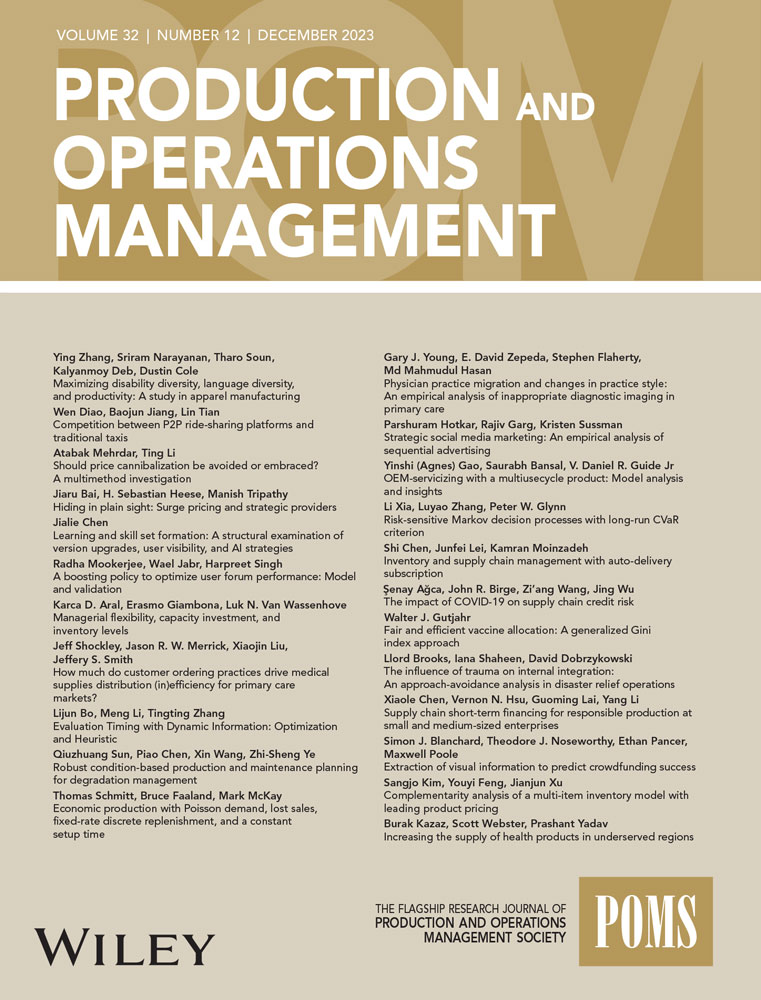Managing material shortages in project supply chains: Inventories, time buffers, and supplier flexibility
IF 5.1
3区 管理学
Q1 ENGINEERING, MANUFACTURING
引用次数: 0
Abstract
Abstract We consider a two‐stage project supply chain with a downstream project firm producing an engineer‐to‐order (ETO) complex product or a make‐to‐order (MTO), low‐volume, customized industrial product as a project, and an upstream contract supplier supplying a key material to the project. The project faces two uncertainties: project activity time uncertainty and material consumption uncertainty, which may be positively or negatively correlated. In anticipation of these uncertainties, the project firm has to carefully decide its promised project due date to its project customer, against which harsh penalties will be assessed, and his material order quantity to commit to the contract supplier in advance. In most practical settings, project firms order from contracted suppliers via a flexible wholesale price contract consisting of a discounted advance order price and a risk‐premium adjusted expedite order price. The discounted advance order price encourages the project firm to take more inventory risk in the supply chain, and the expedite order price incentivizes the supplier to bear more inventory risk by carrying safety stock in excess of the project firm's advance material order. We formulate an optimization model that solves the project firm's project due date and material order problem, which takes into account the supplier's strategic reaction to the project firm's material order under the flexible wholesale price contract. We show that for MTO projects, risk‐sharing with suppliers on project materials is less important to the project firm, with the project firm assuming ownership of all material inventory in the channel and setting a deliberate project due date being the key. On the other hand, for ETO projects, risk‐sharing with contracted suppliers assumes critical importance. Project firms managing ETO projects should fully exploit the flexibility in the material supply contract to optimally drive the supplier's safety stock level and set the project due date reflecting the shared risk in the supply chain.管理项目供应链中的物料短缺:库存、时间缓冲和供应商灵活性
我们考虑一个两阶段的项目供应链,下游项目公司生产工程师按订单生产(ETO)的复杂产品或按订单生产(MTO)的小批量定制工业产品作为项目,上游合同供应商为项目提供关键材料。项目面临两种不确定性:项目活动时间的不确定性和材料消耗的不确定性,两者可能呈正相关,也可能负相关。考虑到这些不确定性,项目公司必须仔细决定其向项目客户承诺的项目到期日,否则将受到严厉的处罚,并提前向合同供应商承诺其材料订单数量。在大多数实际情况下,项目公司通过灵活的批发价格合同从合同供应商处订购,该合同由折扣的提前订单价格和风险溢价调整后的快速订单价格组成。提前订单折扣价格鼓励项目企业在供应链中承担更大的库存风险,加速订单价格激励供应商携带超过项目企业提前材料订单的安全库存来承担更大的库存风险。在弹性批发价格合同下,考虑供应商对项目公司物料订单的战略反应,建立了解决项目公司项目到期日和物料订单问题的优化模型。我们表明,对于MTO项目,与供应商分担项目材料的风险对项目公司来说不太重要,项目公司承担渠道中所有材料库存的所有权,并设定一个审慎的项目到期日是关键。另一方面,对于ETO项目,与合同供应商分担风险至关重要。管理ETO项目的项目公司应充分利用材料供应合同的灵活性,以最佳方式推动供应商的安全库存水平,并设定反映供应链共享风险的项目到期日。
本文章由计算机程序翻译,如有差异,请以英文原文为准。
求助全文
约1分钟内获得全文
求助全文
来源期刊

Production and Operations Management
管理科学-工程:制造
CiteScore
7.50
自引率
16.00%
发文量
278
审稿时长
24 months
期刊介绍:
The mission of Production and Operations Management is to serve as the flagship research journal in operations management in manufacturing and services. The journal publishes scientific research into the problems, interest, and concerns of managers who manage product and process design, operations, and supply chains. It covers all topics in product and process design, operations, and supply chain management and welcomes papers using any research paradigm.
 求助内容:
求助内容: 应助结果提醒方式:
应助结果提醒方式:


